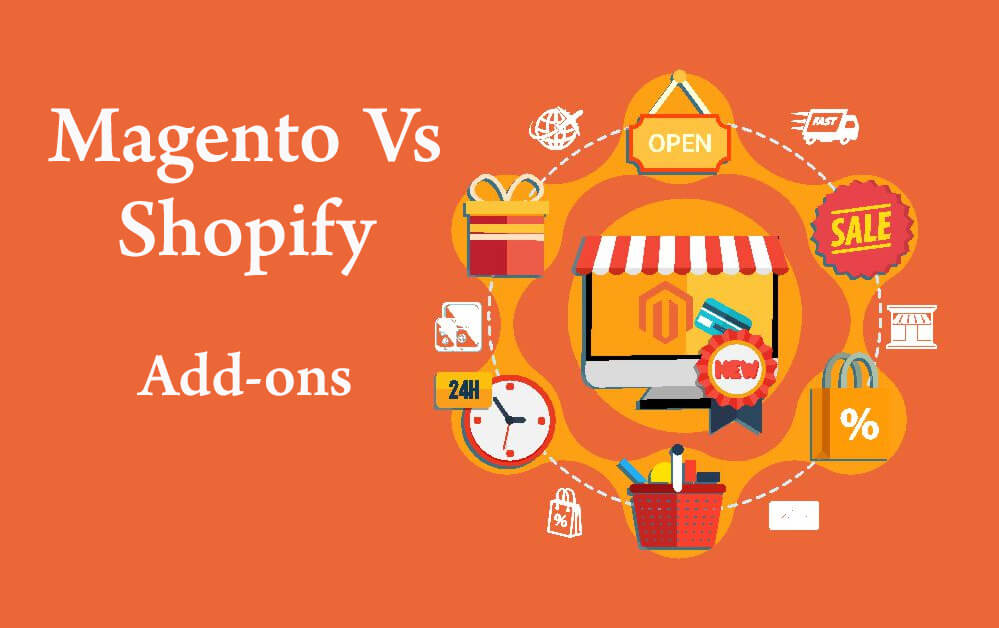Selecting an e-commerce platform is deciding upon the fate of your potential success, future, and operations of your business. Without falling into the trap of marketing strategies of sellers you have to be informed and opinionated. Leaping faith is not just acceptable. The success of an online store and its future growth is at stake if you fail to choose an adequately powered platform. Hence, spending time on research is the best bargain before deciding upon anything.
There are various factors which require analysis before finalizing any platform and in this article, we will cover them all. The internet has dozens of articles comparing Magento, WooCommerce, Shopify, and many other platforms. But are those platforms worth it? It is essential to power your e-commerce site with the best platform to extract maximum return on investment. We have narrowed down the real deal from our experience and expertise in web development to Magento and Shopify. We will start with the basics first, about comprehending whether both Magento and Shopify address the woes of the demand in the market.
Magento Vs Shopify
Both these platforms have identical features is one of the most brewed misconceptions existing. Both Magento and Shopify are drastically different in most of the aspects of functionality although they serve to achieve the same goal. Their functionalities, capabilities, payment options, handle extensions, core structure, and many other things vary from each other.
Magento has earned the reputation of being a self-hosted platform which is also one of the most popular and widely used e-commerce platforms around the globe. From individual store owners and the biggest of brands, it has an exceptionally large user base. Offering both free and premium version for community & enterprise respectively it has been now in operations for more than a decade. To aid the customization of an online store the platform is flexible with unlimited possibilities. Magento has a global ecosystem of 150K+ developers and a network of highly trained 300+ solution partners.
Shopify is a hosted solution which intends to connect with brands that are not so concerned about the technical aspects of a platform. They have a growing user base and have helped customers sell over $55 billion worth of products. They offer a shared hosting infrastructure against monthly subscription fees. It is extremely easy to build dynamic online stores in just minutes.
With the above information, it should be clear why both these platforms are capable and have a huge fan base. Now we will help you in understanding what the similarities are between both these platforms which have earned them this reputation.
Magento Vs Shopify - The Mutual Ground
Not focusing on the core differences of both these platforms, in this section, we have tried to put forward the similarities which happen to be a mutual ground for both these platforms. For the smooth sailing of an online store, they provide a wide range of functionalities and features. And if you have an experience of using either of the platforms you will realize the importance of them.
You also get an easy to use and impressively well-constructed user-interface with both these robust platforms. Both Magento and Shopify have the capabilities to facilitate expansion and growth for scaling your e-commerce store. Undoubtedly the strengths, designing aspects, and capacity of these platforms simply go beyond their charts.
Magento Vs Shopify – Unique in their way
Just like a human being, one platform cannot be perfect and hence for every peculiarity out there, there is always one winner. Hence before keeping forward the comparisons, we recommend, you list out the features that you require the most and then select the best performer. Even if one of the platforms costs you a little more but satisfy all your business needs then do not hesitate to spend on it. Keep your business needs the topmost priority. Following are the crucial factors which need to be evaluated.
1. Controls and Customization
The most prominent and fundamental difference between Magento Vs Shopify is control and hosting.
Magento offers you full control over your choices of hosting and server as it is self-hosted. It enables endless customization possibilities with its open-source nature with complete control over the looks of your store. Without any restrictions of integration and technology, it enables you to update and customize the store at your discretion.
Shopify is a platform which does not require an elevated point of coding expertise as it is a hosted solution. It gives you a hassle-free pass by from configuration and hosting. But, at the same time, you do not get any access to the codes of the store hence limiting your customization options.
2. Speed & Performance

The success of every e-commerce store is correlated with speed and performance. Visitors do not prefer to wait for websites to consume time in loading. If any online portal is even a little weaker in performance then there a little chance that the visitor will return to the site. Hence evaluation of Magento Vs Shopify for this parameter is crucial.
Shopify is a hosted solution and hence the user does not have to worry about the overall performance and page loading speed. At the same time, you are also at a stage where you have no control over server-level adjustments and hosting environments.
Magento offers hosting flexibility which results in robust performance. Because you can choose the server of your choice you have the liberty to make all necessary adjustments at any level of coding to boost your site performance. Advanced technologies such as CDN and caching mechanism can also be used to manage the hosting. Magento offers you a paid and free version so you have to learn the features provided in both of them and then make a call.
3. Payment Gateway Options
For an end-user who is technically a potential client, the payment gateway option is the most important thing. With popular payment options, Shopify offers integration of a custom solution which results in ease of payments.
Magento offers selling options with the help of modules to extend the capabilities of your e-commerce store. For setting up and configuring payment options it provides different modules and add-ons.
4. Themes and Templates
Both these platforms have an enormous collection of themes and both of them provide free as well as paid themes. Magento offers premium themes with significant options at a considerably cheaper price. While for the free themes it has a large collection to suffice your needs.
Shopify is on the same page as Magento. It has fantastic options to choose from. One does not have to make much effort in Shopify to modify and install the themes as the platform does that for you. Magento has complex customization compared to Shopify but at the same time enough room for all the desired customization.
5. Add-ons

The comparison of Magento Vs Shopify for Add-ons favours Magento because it has a bigger collection and smooth integration. Hundreds of vetted extensions in Magento are due to its huge community that strives to offer out of the box functionalities and features. This helps in enhancing your e-commerce website with being worried about the coding part.
Shopify has a comparatively smaller collection of Add-ons. The plus point for this section in Shopify is that it helps in improving the functionality of the store and has a quick and easy installation process.
6. Inventory Management
Both these platforms have a tailored take on the management of inventory. In this comparison of Magento Vs Shopify, both the platforms may serve your needs but the one that does it for you efficiently in less time should be given the credit.
Once you have a look at the inventory management of Shopify you will clearly understand that it is not made up for a large e-commerce website. It has a straightforward interface which is simple so that you can take hold of the inventory. Advanced features like a discount for registered users, promotional flash sales, and others are possible with the capable extension.
Just like Shopify, Magento also has a basic inventory upload. But it leads when it comes to advanced features. Variation options, third-party integration services, widening distribution network, and other such things are possible with Magento. It might take you a long time to work & develop these features but they will pay off in the long run.
7. SEO and Marketing

A basic set of SEO options is included with Shopify. It allows you to optimize product pages and inventory in an SEO friendly environment and also allows editing the Meta tags. The platform makes it easier for search crawlers to function easily as it enables in-depth optimization which helps in modifying the file structure. Server-level modifications are not possible due to lack of self-hosting feature.
All the custom SEO and digital marketing strategies can be implemented and integrated with the Magento platform. Both the SEO strategy and the store design can be tweaked to obtain maximum output. Fine-tuning of permalinks for inventory items and Meta content can be easily carried out. The maximum advantage of redirects, canonical tags, and no-follow links can be obtained only on Magento. This helps and makes it convenient for search engines to understand and index the structure of e-commerce websites.
8. Customer Support
Customer support is a crucial factor in the comparison of Magento Vs Shopify. Dedicated customer service and support are provided by Shopify. Magento offers certified individuals and backend & frontend developers because it has dedicated community-based support to offer to its customers. Magento has the reputation of having a considerable large workforce which keeps expanding for the growth and sustainability of its clients.
Magento forums are the easiest way of discussing any technical issue with their community. A Magento partner will also help you in setting up, management, store creation, and for every other thing.
9. Pricing

The pricing of Shopify is based on a subscription-based model. You can try the platform for free in a trial version but you will soon end up paying for it. The basic and affordable plan for Shopify starts at $29 a month. For an advanced Shopify plan, the rates are elevated to $299 a month. The elevated rates provide you access to an extensive set of features which includes gift cards, advanced statistics, and more. Themes and extensions are not included in this subscription and must be paid extra.
A transaction fee is also levied by Shopify when the payment is made through external payment gateways which include PayPal, Braintree, and many others.
If you intend to use Magento Open Source then the web-hosting cost depends upon whether you choose to host or not. For Magento in general and in Magneto’s commerce cloud, everything is custom in the store according to your needs and hence does not have a fixed price. If you intend to compare the exact price of Magento Vs Shopify platform, then you will have to list out the exact features that you require for your hosting and then talk to a Magento Partner or Team Magento for exact rates and all other hidden charges. Magento undoubtedly will provide you with a dynamic platform but it may charge you more compared to Shopify.
Just as we started, in the beginning, no platform is perfect both of them have something or the other more peculiar to offer. It is for you to decide which suits your business models and can stand out for you in the long run. In terms of functionality, capability, and scalability both stand strong and have proved their mettle. But your decision must boil down to the one that best suits your needs.
Shopify comes with easy installation, lower monthly cost, and adequate customization. Magento offers powerful features, freedom of customization, and scattered cost for all the services you opt. In this comparison of Magento Vs Shopify everyone has a different winner. We recommend you list out the requirements of your site first and then choose wisely after analyzing the above factors.





